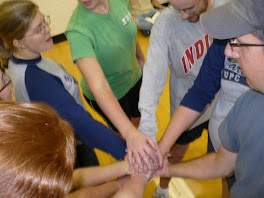
In 2007, I was privileged to be on the staff of College Connection, a conference at Mo Ranch that turned out to be incredibly meaningful and memorable for everyone who was there. It was fun to watch the students bond so quickly. There were games upon games of volleyball, soccer, and ultimate frisbee. And yes, I lament, there were of course, energizers upon energizers.
More importantly, small groups led to significant discussions, and worship was powerful and unforgettable. All of these aspects became the foundational building blocks that made the conference wonderful, but as is so often true, sometimes it's possible to catch some meaningful unplanned encounters between the cracks.
Late one evening, I was exhausted and sitting in the Guest Lodge with many of the students. I overheard two of them asking Ben, another staff member, questions about what it means to be Presbyterian. I wasn't really participating, but when one of them asked, "So, what's predestination? What does predestination mean?" I started laughing. "How's he gonna answer that?" I thought. Predestination hasn't always been articulated in helpful ways within our tradition. But he had a wonderful way to answer the question. He went on to talk about God pledging to be God toward us, and he talked about who we are in relation to that pledge. Then to bring the idea home, he mentioned his daughter. He said, "She can act like she's not my daughter. She can refuse to talk to me or think about me. But here's what I say to that: 'I'm not going to let you not be my daughter!'" I thought it was a beautiful way to discuss what predestination means.
But does a statement like that have other types of implications? Can we think about election on a horizontal plane? Perhaps it's possible for us to pledge ourselves toward other people, and perhaps can we talk about who people are in relation to that pledge. What if we have the ability "elect" others?
Now, I'm not talking about throwing ourselves on other people. It's easy to do this when we feel a need to be needed. But I think "electing others" means something different altogether. It means that we make ourselves available -- not as "possibility" but "actuality." It means that we don't say, "Well, I'll be here if you need me," as in "I might be with you. It's up to you." It means that we pledge, "I am here. Even when you're unable to ask for me to be with you, I will be. I'm going to show up. And as much as it's up to me, I'm not going to let you go through life alone! I will be who I am called to be toward you." There's a big difference between being with one another potentially and actually.
A comment like, "I'll be here if you need me," may be the most appropriate statement if it means "I am still with you. You can count on me." But it's not "horizontal election" if we say it to feel good about ourselves: "Well, I said the right thing. I said I will be there. Nothing will happen, of course, because I'm waiting for the other person to act upon what I said to make it real. But I said what I needed to say. I performed my obligation. Now I'm off the hook. Now I can feel good about myself."
No, "horizontal election" means that we make it real. We actualize it. We show up. It's the complete opposite of obligation. It means that we make ourselves responsible toward people for whom culture and society say we're not responsible. It means that we live toward people for whom culture and society say we're not obligated. We do it because it is right and true. We do it because we're called to live in such a way. And we are called to do it in a way that we seek no gratification or laurels for ourselves in the process. We expect nothing in return. And yet we do gain something! We live into the reality of who we're created to be! We live alongside others, suffering and rising with them, watching them discover who they are. We watch them discover Whose they are. They belong to the One who says, "I'm not going to let you not be my child!"
The good news is that this way of loving moves way beyond the sphere of obligation.
The truth is, I don't want people to love me because they're obligated. I don't want people to love me because they're giving me a service. I don't want people to love me because it's their job or because they are obligated to play a role. I want people to be human with me and love me, warts and all. Forget the roles. Forget the paradigms. Be human with me. Stick around. Accompany me. Elect me. Don't let me not belong to you.
That is how I want to live! I have failed at it before, and I will fail at it again. But it's how I want to live. People have failed me before, and they will fail me again. But this is how I want them to live! Election is no small matter. It means that people pledge themselves toward one another to be with them long term. Of course, people can't always be physically present, but there is a way to be available toward others that doesn't even require physicality. It requires commitment. It requires steadfastness -- a journey for the long haul.
Perhaps this is the kind of love that God dreams for us.
- Renee









































No comments:
Post a Comment